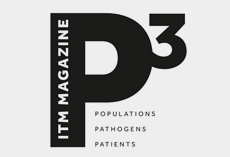What is the impact of COVID-19 on potentially vulnerable groups in Antwerp?

Researching ethnic minorities during a pandemic requires a distinct approach. Since March, ITM researcher Christiana Nöstlinger has been coordinating a research project on the impact of COVID-19 on three ethnic minority groups in Antwerp.
Before the lockdown started in Belgium, Christiana was working on the HIV-SAM project, which implements interventions of HIV prevention and sexual health promotion for communities with sub-Saharan African background in Flanders. “Due to the COVID-19 situation, the outreach prevention work was no longer possible. At the same time, we got ques tions on COVID-19 from this particular group,” Christiana explains. Also, the Governor of Antwerp and Chair of ITM’s Board of Governors Cathy Berx and ITM Director Marc-Alain Widdowson proposed researching the information reach of COVID-19 measures among cultural-ethnic minorities.
The Orthodox Jewish community, the Turkish/Moroccan community and the sub-Saharan African community living in Antwerp were the three groups of interest. “At the beginning of the lockdown the Orthodox Jewish community was singled out in the media. To us, it was very important to avoid the stigmatisation of any group and to look from an objective point of view. Are these groups getting the information they need? That was our main question.”
Because of COVID-19 measures, real life face-to-face interviews were off the table. “We then opted for another procedure and did video calls with the interviewees. This approach presented its own challenges: there were instances of poor internet connection, distracted interviewees as the calls took place in their homes, and limited body language. But we managed.”
This rapid assessment had to run quicker than usual. “That’s why our preliminary findings are based on summaries of the interviews. The full transcripts of the interviews were typed out in a later phase, to be able to produce more detailed publications.”
Similar to other research assessments, key community members were contacted. For instance, integration services such as Atlas and Samenlevingsopbouw vzw (community development organisation), helped to create a snowballing system for finding key people in the Turkish/Moroccan community. Also, people taking up a leading role or a coordinating position in the Orthodox Jewish community were invited to take part in the project. More than 20 key informant interviews, in-depth interviews and online group discussions have taken place so far.
Research is a process. Along the way, from ‘Are these groups getting the information they need?’, the research question evolved into ‘What is the impact of COVID-19 on the community?’, Christiana explains. “During the process it became clear that a lot of information on COVID-19 reached these groups, and in particular the Jewish community of Antwerp.They are very well organised internally, with their own structural network that informs other Jewish inhabitants of Antwerp.”
“What we did notice is the collateral damage of the lockdown measures. Practicing their religion is very important for the Jewish community: not being able to pray together, to go to the synagogue and do other religious rituals caused a lot of harm. In a really early stage people within the community worked out a plan on how to safely practice their religion while respecting COVID-19 prevention measures. For them, the governmental permission for reopening the synagogues took a very long time."
“Religious practices and social gathering seem really important in the other two communities as well. We found out that among sub-Saharan communities, people tend to rely more on their own social networks and certain types of social media when gathering their information. Due to the amount of ‘fake news’ that people are confronted with, we observed a great need for correct and clear information about the new disease and effective prevention measures to reduce COVID-19 related anxiety and uncertainty. In general, people in this group tend to be more afraid and anxious when they don’t get reliable and clear information."
With the resurgence of COVID-19 infections during the summer, this type of action research can play an important role in informing policy and prevention, such as channelling tailor-made information to community members through the established networks. The project has been consulted by the City and Province of Antwerp to support target group-specific policies.
Christiana Nöstlinger coordinates the project as principal investigator (PI) to- gether with Koen Peeters as Co-PI. The project involves several ITM research groups. These are: the Unit of Sexual & Reproductive Health, the Unit of Medical Anthropology and the Outbreak Research Team (ORT). ITM investigators who worked on this assessment are: Jef Vanhamel (responsible for the Orthodox Jewish community), Anke Rotsaert, Maya Ronse, Yoriko Masunaga, Ella Van Landeghem (responsible for the Turkish/ Moroccan community), Thijs Reyniers, Charlotte Gryseels, Lazare Manirankunda and Charles Ddungu (responsible for the African community), Deogratias Katsuva, Stef Dielen, Marie Meudec (ORT), and Greet Segers, Monique Ceulemans (for administrative support).
Spread the word! Share this story on










